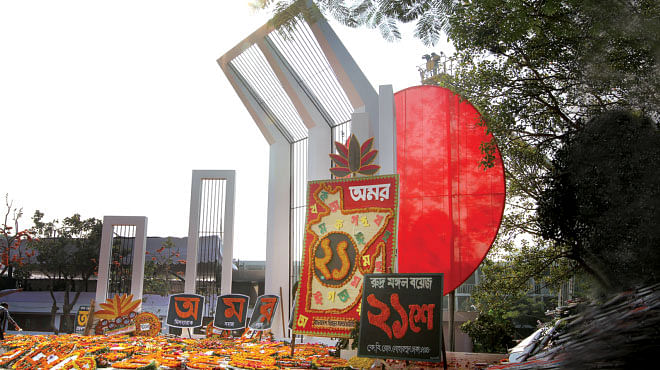EKUSHEY FEBRUARY: The Seed of Bengali Nationhood
EKUSHEY FEBRUARY: The Seed of Bengali Nationhood

By the end of World War II, it was evident a New World Order was emerging. British India was one of the first nations to break away from colonisation. At midnight in the middle of August 1947, British India was divided into two countries. India emerged as a country for a Hindu majority. Pakistan emerged as a country for a Muslim majority. Soon after freedom, both countries realised religious diversity was not the only diversity that needed to be addressed and handled with care. Diversity also existed in the forms of ethnicities and languages in both the new nations.
Pakistan was geographically divided into two wings: West and East. In between there was 2,000 kilometres of India. West Pakistan (today's Pakistan) was divided into various ethnicities; each spoke a different language. Punjabi, Sindhi, Baluch and Peshto were the four major languages of the western wing. There was no unifying language in West Pakistan. Linguistically and nationalistically, the people of East Pakistan (today's Bangladesh) were more similar. Bangla was the language of the majority. Bengalis were the majority, by population, in both East and West Pakistan. Bangla was therefore the language of the majority. The founders of Pakistan failed to recognise and appreciate this historical reality.
In December 1947, the Education Conference in Karachi adopted the resolution that Urdu will be the only state language of Pakistan. It was also decided that Bangla would be abolished from all forms of state printing. On March 21, 1948, the Governor General of Pakistan, Muhammd Ali Jinnah declared at the Race Course Maidan (Suhrawardy Uddyan), “Urdu, only Urdu shall be the State language of Pakistan.” In reality, Urdu was not the language of any province of either wing of Pakistan. On January 27, 1952, the then Prime Minister, Khwaja Nazimuddin again declared “Urdu will be the State language of Pakistan.” This naturally upset the Bengalis in the eastern wing who constituted more than half of the population of Pakistan. An All Party Central Language Action Committee was formed on January 31 with Maulana Abdul Hamid Khan Bhashani as the Chair. The Central Government's decision to write Bangla in Arabic-Farsi script was strongly opposed. The stage was set for the first seeds of Bangladesh to be sown at University of Dhaka, mid-day, February 21, 1952.
Students gathered at the University Gate and tried to break the line of Section 144. Police fired tear gas and did not listen to the Vice Chancellor's request to stop firing and leave the university premises. Enraged by police arrests, the students proceeded towards the East Bengal Legislative Assembly (Parliament). This time the police fired live bullets. Years before Tiananmen Square shook the world, the streets of Dhaka showed it is a historical impossibility to resist moral demands of people. Salam, Rafiq, Barkat and Jabbar became the first martyrs. Their blood laid the seeds of Bengali nationalism and nationhood. A new colonial master, Pakistan, replaced the old one, Britain. A new battle and a new dawn had begun -- the struggle to recognise the aspirations of the Bengalis. Abdul Gaffar Chowdhury wrote the lyrics; initially, Abdul Latif gave the tune, but later Altaf Mahmud's tune captured the persona of the lyrics. “Amar Bhaier Rokte Rangano Ekushey February, Ami Ki Bhulite Pari” became the first anthem towards freedom among the Bengalis of East Pakistan. “Ekbar Bidai De Ma, Ghure Ashi” for Khudiram Bose by Pitambar Das from a previous generation resonated, Bengalis cannot be kept suppressed for too long.
Ekushey February was a turning point for the Bengalis of Pakistan. It reminded them of the inequalities they were exposed to by a minority of rulers in the western wing. Ekushey February was also a turning point in history. The moral rights of people to defend their identity cannot be denied, suppressed or neglected. The International Mother Language Day (from 1999) is testimony to two of the greatest lessons of history. First: very few rulers learn from history. Second: events like Ekushey February define nationhood.
Asrar Chowdhury teaches economic theory and game theory in the classroom. Outside he listens to music and BBC Radio; follows Test Cricket; and plays the flute. He can be reached at: asrar.chowdhury@facebook.com